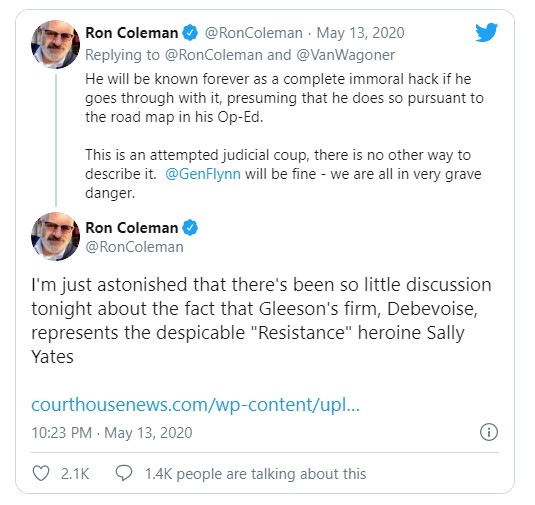
Not quite two weeks ago, Judge Emmet Sullivan threw open the doors of his federal courtroom to the swamp when he invited third parties to pontificate on the propriety of the Department of Justice’s motion to dismiss the criminal charges against Michael Flynn. The next day Sullivan went further: He appointed a former federal judge, John Gleeson, as an amicus curiae, or friend of the court, to argue that the government’s motion to dismiss should be denied.
Judge Sullivan’s selection of Gleeson as amicus curiae gave away the game. The same day Sullivan named Gleeson as amicus curiae, an op-ed by Gleeson and two cohorts ran in the Washington Post declaring the government’s decision to dismiss the charge against Flynn “reeks of improper political influence.”
The Washington Post cloaked Gleeson and his co-authors, David O’Neil and Marshall Miller, with an aura of impartiality and authority by highlighting their past service in the Department of Justice: “John Gleeson served as a U.S. district judge for the Eastern District of New York and chief of the Criminal Division in the U.S. Attorney’s Office in that district. David O’Neil served as the acting assistant attorney general for the Justice Department’s Criminal Division and assistant U.S. attorney in the Southern District of New York. Marshall Miller served as the highest-ranking career official in the Criminal Division and as chief of the Criminal Division for the U.S. Attorney’s Office for the Eastern District.”
Spritz a Swamp Creature, and There’s Still a Stench
The titles, however, do not tell the whole story. After stepping down from the federal bench, Gleeson joined the law firm of Debevoise, which as Attorney Ron Coleman noted, represented the “Resistance heroine Sally Yates.”

Recall that Yates created political hay when, while serving as acting attorney general, she refused to defend President Trump’s travel ban and directed her subordinates to do likewise, forcing Trump to fire her. (Courts later upheld the travel ban).
Yates’ insubordination drew the accolades of Andrew Weissmann, who later served as Special Counsel’s Robert Mueller’s “pit bull.” “I am so proud. And in awe. Thank you so much. All my deepest respects,” Weissmann emailed Yates after learning of her political play.
Weissmann’s applauding of Yates’ political grandstanding was the least of his anti-Trump bias. As I noted previously, “We also have Weissmann’s financial support of the Democratic National Committee and Hillary Clinton through thousands in campaign contributions. The Wall Street Journal also reported that Weissmann attended Clinton’s 2016 election night party in New York City, further raising the specter of an anti-Trump bias at play.”
Since the special counsel’s office closed last year, Weissmann hasn’t even tried to mask his bias, signing on to serve as a “legal analyst” for NBC and MSNBC to assist the left in pushing the Ukraine impeachment hoax. Then came news last week that Weissmann will headline a “fireside chat” fundraiser for Democrat presidential candidate Joe Biden.
Weissmann’s decision to raise cash for the Biden campaign leads one to wonder what he may be doing behind the scenes to support the Democratic challenger. Might he be suggesting angles or otherwise assisting Gleeson? After all, as the Twitter sleuth Techno_Fog pointed out, Gleeson and Weissmann once worked together.
Actually, they did more than merely work together: together they took on the Gambino crime family. Thomas Gambino’s challenge to his criminal conviction revealed this. In his appeal, Gambino sought a new trial based on the government’s failure to produce notes taken by an FBI special agent during questioning of a witness. As the opinion noted, “also present at that interview were Assistant United States Attorneys John Gleeson and Andrew Weissmann.” (The Gambino court held the government in that case had not wrongly withheld the notes.)
Somebody’s Biased, and It Ain’t Barr
Notwithstanding the many connections between Gleeson and members of the Resistance, and the obvious bias of Weissmann and other former special counsel team members, such as Lisa Page and Peter Strzok, the left and Never Trump right are portraying Mueller and the special counsel’s office as the apolitical arbiters of justice and Sullivan and his hand-selected amicus as defenders of the rule of law. Attorney General William Barr, to them, is but a political pawn who cannot be trusted to oversee the Flynn case.
Yet this thesis ignores the reality that Barr brought in two outside U.S. attorneys to oversee the investigation of the Russia-related targeting of the Trump campaign and administration: Missouri-based U.S. Attorney Jeff Jensen and Connecticut U.S. Attorney John Durham. While Mueller stacked his team with political hacks, and Judge Sullivan has now followed suit, there is no similar stench surrounding Jensen or Durham’s staffing decisions. In fact, it was Jensen, not Barr, who initially concluded that the prosecution of Flynn was unwarranted and recommended the criminal charge be dismissed.
Those condemning the DOJ’s decision to drop the charge against Flynn likewise ignore the growing evidence of misconduct by both the FBI and the federal prosecutors who handled the Flynn case. In its motion to dismiss the criminal charge against Flynn, the government highlighted the already-public evidence of misconduct, such as the text messages that revealed that FBI management intercepted the closing memorandum in the Flynn case, holding open the investigation to provide a pretext to question Flynn on January 24, 2017, about his conversations with the Russian ambassador.
The government also detailed in its motion to dismiss changes made to the FBI’s 302 interview form that, when read in light of the corresponding text messages, establish that FBI attorney Page wordsmithed FBI agent Joe Pientka’s interview summary, with Strzok’s help, to create the impression that Flynn had made false statements to the FBI—the crime for which he was later charged.
And then there are the handwritten notes of now-retired FBI Assistant Director of Counterintelligence Bill Priestap, questioning the department’s goal in interviewing Flynn: “What is our goal? Truth/Admission or to get him to lie, so we can prosecute him or get him fired?”
FBI Review Unlikely to Change Resistant Minds
Rather than express outrage over this government misconduct, the left and Never Trump right decided to spin the DOJ’s decision to dismiss the Flynn case as politically motivated and directed by a tainted attorney general.
One would think, however, that last week’s announcement by FBI Director Christopher Wray that the bureau will undertake an “after-action review” of the Flynn case should squelch that storyline. After all, to date, Wray has avoided the press’ guilt-by-association smear other members of the Trump team have been subjected to. So the director’s decision to evaluate the FBI’s role in the Flynn case and assess whether any “current employees engaged in misconduct” should give the media pause.
It won’t, though. Just as corporate media ignored Weissmann, Page, and Strzok’s clear political bias, they will continue to ignore the growing evidence of misconduct and the near-daily revelations of impropriety coming from the Jensen and Durham investigations, as well as from newly declassified material.
Rather than come to terms with the fact that it was President Obama and his team who weaponized the DOJ, Judge Sullivan, by welcoming third-party briefing in the Flynn case, gifted the Resistance a platform to continue to push nonsensical conspiracy theories under the guise of law and order.
A Bunch of Hypocrites
Already the anti-Trump Protect Democracy Project has submitted an amicus curiae brief to Judge Sullivan. That brief rehashes many of the political talking points left-leaning pundits and politicians have been peddling since Trump took office, then argues that in seeking to dismiss the criminal charge against Flynn, Trump and Barr have “flouted” the principle that the DOJ’s investigatory and prosecutorial powers should “be exercised free from partisan consideration.”
The irony couldn’t be richer. The Obama administration targeted Flynn because the glow of Orange Man Bad reached the retired general’s orbit. But, according to Protect Democracy, it is the Trump administration’s DOJ that is playing politics with prosecutions!
Then there’s Protect Democracy’s ridiculous casting of itself as “a bipartisan group of former federal prosecutors and former high-ranking supervisory officials in the Department of Justice,” including “nonpartisan career” employees and political appointees of both parties. The facts tell a different story, as I previously reported for The Federalist:
Protect Democracy was founded in 2017 by Ian Bassin, who was the associate White House counsel for President Barack Obama from 2009-2011, and Justin Florence, who also served in the Office of the White House Counsel as a special assistant to the president and associate counsel of the president.
Bassin is also the president of the liberal American Constitution Society and Florence had also served as a senior counsel on the Senate Judiciary Committee for Sen. Sheldon Whitehouse (D-R.I.). Protect Democracy also boasts a Who’s Who of the Never Trump resistance as advisors, such as failed presidential candidate Evan McMullin and running mate Mindy Finn.
The self-branded “bipartisan” group of former prosecutors also leans heavily left, and any “bipartisanship” comes from extreme Resistance members claiming Republican status.
In any event, why should Judge Sullivan consider the opinion of some 1,100 former federal prosecutors significant? The size of the contingency says nothing of the merits of the DOJ’s action, and if size mattered, the total number of signatories is but a sliver of the total number of DOJ attorneys now retired or working elsewhere.
The former prosecutors also have no special knowledge of the Flynn case and their status provides them no claim to moral authority. In fact, to the contrary, the history of some of the former federal prosecutors—which includes a felony conviction for stealing more than $600,000 from a client’s investment account for one signatory and being suspended from the bar with a pattern of misconduct for another—suggests their views should hold no weight.
Some Great Judges You Have There
The chutzpah award, however, must go to signatory Shira Scheindlin, who identified herself in the Protect Democracy brief as a former first assistant U.S. attorney. Later in her career, Scheindlin served as a federal judge in New York, where among her more infamous rulings was her decision to toss the conviction of Judith Clark. Clark was a member of the Weather Underground who had been convicted of three counts of murder in the second degree for driving a getaway car following the group’s robbery of an armored truck.
In that case, Scheindlin ruled that the government had violated Clark’s Sixth Amendment right to counsel, even though Clark declined legal representation then opted to “absent” herself from the courtroom as a form of political protest. The Second Circuit promptly reversed Scheindlin’s ruling and rejected Clark’s challenge to her conviction.
The idea that Judge Sullivan should take guidance from Scheindlin is laughable. But what isn’t funny is that Sullivan invited the politicizing of the legal process. Not President Trump. Not William Barr. Judge Sullivan.
While that process has already begun, the D.C. Circuit Court of Appeals may abruptly halt the circus, having ordered Sullivan to respond to Flynn’s request that the appellate court order Sullivan to dismiss the criminal charge against him. The D.C. Circuit gave Sullivan until June 1 to respond.
In yet another irony, over the weekend news broke that Sullivan had hired Washington D.C. attorney Beth Wilkinson to represent him before the D.C. Circuit. While the optics of a federal judge hiring an attorney proved jarring to some, it is entirely appropriate for an attorney to represent a judge in a mandamus petition.
But, still, Judge Sullivan’s selection of Wilkinson—the lawyer who represented Hillary Clinton during the FBI’s investigation into her mishandling of classified information on her homebrew server—solidifies the image of the long-time federal judge standing ensconced in the swamp.









